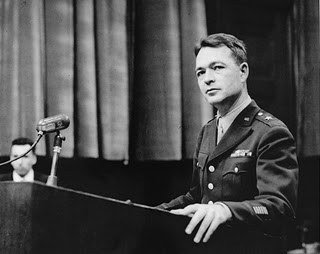Nuremberg and Vietnam
"If I was asked to name the person of my generation whom I most admired, I would promptly answer Telford Taylor. ... [W]ise counselor, persuasive advocate, careful scholar, all the qualities that signify distinction ... were his in high degree." So wrote Herbert Wechsler, who worked with Taylor at Nuremberg.
I once met Telford Taylor — briefly but at least I met him. It was at a conference on the Nuremberg Trials. Well, I should say the series of sessions, hosted by a nonprofit holocaust education group, featured discussions of what is generally called "judgment." The only panel I attended which I remember in any detail included Taylor and a wonderful energetic man named Benny Ferenz. Ferenz had been one of Taylor's assistants in the prosecutions at Nuremberg. Iniitally Taylor was assistant to the U.S. chief counsel at the long postwar trials, second fiddle to Robert H. Jackson (later a Supreme Court justice). But Jackson left to go back to the States and Taylor himself became chief counsel. Taylor was critical of many aspects of the Nuremberg proceedings. He felt that the prosecutions were undermined by the cold war, which forced the focus to shift from the Nazis to the Soviets as enemies. Denazification was not just an apt thing in itself; it was driven by anticommunist policy: make the Germans our friends quickly and we will have a central European bulwark against the Russians. Taylor felt implicit and explicit pressure to ease up.
Iniitally Taylor was assistant to the U.S. chief counsel at the long postwar trials, second fiddle to Robert H. Jackson (later a Supreme Court justice). But Jackson left to go back to the States and Taylor himself became chief counsel. Taylor was critical of many aspects of the Nuremberg proceedings. He felt that the prosecutions were undermined by the cold war, which forced the focus to shift from the Nazis to the Soviets as enemies. Denazification was not just an apt thing in itself; it was driven by anticommunist policy: make the Germans our friends quickly and we will have a central European bulwark against the Russians. Taylor felt implicit and explicit pressure to ease up.
After the trials were done, he went home, into private practice, but McCarthy's rise forced him into public positions. He worked hard as a detractor of McCarthy, at a time when this could make one seem a subversive. David Rudenstine has written: "Telford gave a speech at West Point in which he attacked McCarthy as a "dangerous adventurer" and described the then ongoing congressional investigations of the political left as 'a vicious weapon of the extreme right against their political opponents.'" In the same speech, Telford criticized President Eisenhower and the Secretary of the Army, Robert T. Stevens, for not standing up "against the shameful abuse of Congressional investigatory power." To me the most impressive thing about Telford Taylor's life and work is the way in which his opposition to the American involvement in Vietnam was related to lessons we did not learn from the Holocaust. His book, Nuremberg and Vietnam, puts such a war into the context of genocide and postwar judgment. I urge everyone reading this to pick up a copy of Nuremberg and Vietnam: a short brilliant book. You will not think of the Vietnam War the same way again.
To me the most impressive thing about Telford Taylor's life and work is the way in which his opposition to the American involvement in Vietnam was related to lessons we did not learn from the Holocaust. His book, Nuremberg and Vietnam, puts such a war into the context of genocide and postwar judgment. I urge everyone reading this to pick up a copy of Nuremberg and Vietnam: a short brilliant book. You will not think of the Vietnam War the same way again.
It's possible to say that the international human rights movement was begun by Telford Taylor.
"The laws of war," Taylor wrote in his memoir of Nuremberg, "do not apply only to the suspected criminals of vanquished nations. There is no moral or legal basis for immunizing victorious nations from scrutiny. The laws of war are not a one-way street."
At the end of the year Taylor died, the Times included him in its year-end round-up of short essayistic obituaries. Here's a link (PDF) to Taylor's.